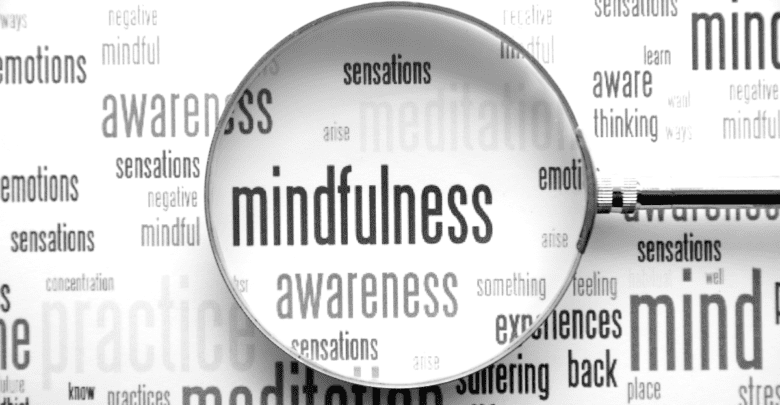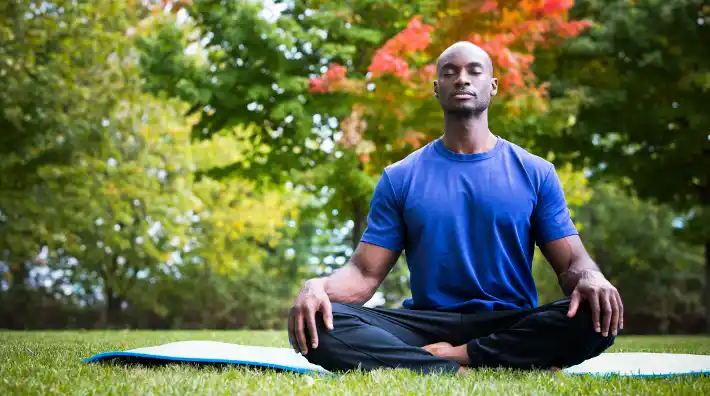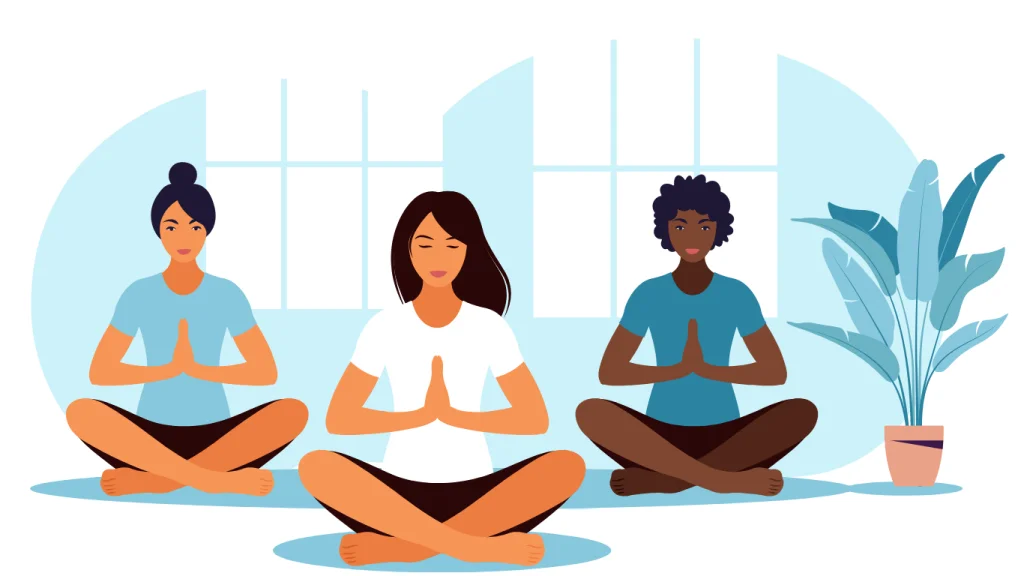
Meditation has been shown to affect the brain in several ways. Studies have found that regular meditation can increase the thickness of the prefrontal cortex, the area of the brain responsible for decision-making, attention, and self-awareness. It can also reduce activity in the amygdala, the part of the brain that processes fear and stress. These changes in the brain can lead to improvements in mood, cognitive function, and overall well-being.
In addition to affecting the brain, meditation has also been shown to have physiological effects on the body. It can lower blood pressure, reduce inflammation, and improve immune function. Meditation has also been shown to improve sleep quality, which can have a positive impact on physical health. Overall, the science behind meditation suggests that it is a powerful tool for promoting both physical and mental health.
Physical Benefits of Meditation

Regular meditation can have many physical benefits. It can reduce blood pressure, lower levels of stress hormones, and improve immune function. Meditation has also been shown to improve sleep quality, which can have a positive impact on physical health. Additionally, meditation can help manage chronic pain by reducing the perception of pain and increasing pain tolerance.
Research has also found that meditation can improve heart health. One study found that people who practiced meditation for six months had a significant reduction in the risk of heart disease. Another study found that meditation can improve cardiovascular health by reducing inflammation in the body.
Mental Health Benefits of Meditation

In addition to its physical benefits, meditation can also have a positive impact on mental health. It can reduce symptoms of anxiety and depression, improve mood, and increase feelings of well-being. Meditation has also been shown to improve cognitive function, including memory, attention, and executive function.
One study found that people who practiced meditation for eight weeks had significant improvements in symptoms of anxiety and depression compared to a control group. Another study found that mindfulness meditation can reduce symptoms of post-traumatic stress disorder (PTSD) in veterans.
Emotional Benefits of Meditation
Meditation can also have a positive impact on emotional well-being. It can increase feelings of compassion, empathy, and gratitude. Regular meditation can also help reduce negative emotions, such as anger and fear.
Research has found that practicing loving-kindness meditation, which involves directing positive thoughts and feelings towards oneself and others, can increase feelings of compassion and reduce feelings of social isolation. Another study found that mindfulness meditation can reduce symptoms of emotional exhaustion and increase feelings of resilience.
Meditation and Stress Reduction
One of the most well-known benefits of meditation is its ability to reduce stress. Regular meditation can reduce the production of stress hormones, such as cortisol and adrenaline, and increase the production of feel-good hormones, such as serotonin and dopamine. This can lead to a reduction in symptoms of stress, including anxiety, depression, and insomnia.
Research has found that mindfulness meditation can be particularly effective for reducing stress. One study found that people who practiced mindfulness meditation for eight weeks had significant improvements in perceived stress compared to a control group.
Meditation and Mindfulness
Mindfulness is a state of non-judgmental awareness of the present moment. It involves paying attention to your thoughts, feelings, and sensations without judgment or distraction. Meditation is a tool for cultivating mindfulness, and regular meditation practice can lead to an increase in mindfulness in everyday life.
Research has found that mindfulness meditation can improve attention and focus, reduce mind-wandering, and increase self-awareness. It can also improve communication and interpersonal relationships by increasing empathy and compassion.
Different Types of Meditation

There are many different types of meditation, each with its own benefits and challenges. Some of the most common types of meditation include:
- Mindfulness meditation: This involves focusing your attention on your breath, body, or thoughts and observing them without judgment or distraction.
- Loving-kindness meditation: This involves directing positive thoughts and feelings towards oneself and others.
- Transcendental meditation: This involves repeating a mantra to achieve a state of deep relaxation and inner peace.
- Yoga meditation: This involves combining physical postures with meditation to promote physical and mental well-being.
Incorporating Meditation into Your Daily Routine
If you’re new to meditation, it can be challenging to know where to start. Here are some tips for incorporating meditation into your daily routine:
- Start small: Begin with just a few minutes of meditation each day and gradually increase the amount of time as you become more comfortable.
- Find a quiet space: Choose a quiet space where you won’t be interrupted or distracted.
- Set a timer: Use a timer to help you stay focused and avoid checking the clock.
- Be consistent: Try to meditate at the same time each day to establish a consistent routine.
- Be patient: Don’t expect to see immediate results. Meditation is a practice that takes time and patience to develop.
Resources for Guided Meditation
Guided meditation can be a helpful tool for beginners who are just getting started with meditation. There are many resources available online, including apps, videos, and podcasts. Here are some popular options:
- Headspace: A popular meditation app with guided meditations for beginners and experienced meditators.
- Calm: Another popular meditation app with guided meditations, sleep stories, and music for relaxation.
- Insight Timer: A free meditation app with guided meditations, music, and talks from leading meditation teachers.
- YouTube: There are many guided meditation videos available on YouTube, including those from popular meditation teachers and organizations.
The Transformative Power of Meditation

Meditation is a powerful tool for promoting physical, mental, and emotional well-being. It can reduce stress, improve cognitive function, and increase feelings of compassion and gratitude. With regular practice, meditation can transform your life in profound ways. Whether you’re new to meditation or an experienced practitioner, there are many resources available to help you develop your practice and reap the many benefits that meditation has to offer.
Meditation for your life
If you’re interested in incorporating meditation into your daily routine, start small and be patient. Remember that meditation is a practice that takes time and dedication to develop. Try different types of meditation and find what works best for you. And don’t forget to take advantage of the many resources available online, including apps, videos, and podcasts. With regular practice, you can unlock the hidden benefits of meditation and transform your life.
Benefits of Meditation FAQs
Q: Why is meditation necessary?
A: Meditation is necessary because it offers numerous mental, emotional, and physical benefits. In our fast-paced and stressful world, meditation provides a way to calm the mind, reduce stress, and promote relaxation. It helps cultivate mindfulness, which is the practice of being fully present in the moment, leading to increased self-awareness and a deeper connection with oneself and others. Meditation has been shown to improve concentration, enhance emotional well-being, promote better sleep, and even boost the immune system. It is an invaluable tool for achieving balance, inner peace, and overall well-being.
Q: Does meditation help you find yourself?
A: Yes, meditation can help you find yourself. By regularly engaging in meditation, you create a space for self-reflection and introspection. It allows you to quiet the noise of the outside world and dive deep into your inner world. Through meditation, you can gain insight into your thoughts, emotions, and patterns of behavior. It helps you develop a greater understanding of yourself, your values, and your desires. By cultivating self-awareness and being present in the moment, meditation can guide you on a journey of self-discovery and lead to a more authentic and fulfilling life.
Q: How long do you need to meditate to see benefits?
A: The duration of meditation required to experience benefits can vary from person to person. However, even short sessions of regular meditation can yield positive effects. Starting with just a few minutes of daily meditation and gradually increasing the duration over time can be beneficial. Some individuals may notice improvements in focus, stress reduction, and overall well-being after a few weeks of consistent practice, while others may require several months to experience noticeable benefits.
Q: Can meditation help with confidence?
A: Yes, meditation can help with confidence. Confidence is closely linked to self-esteem and self-belief, and meditation can play a significant role in cultivating these qualities. By practicing mindfulness and meditation, you become more attuned to your thoughts and beliefs. You can observe and challenge self-limiting beliefs and negative self-talk, replacing them with positive and empowering thoughts. Meditation also helps to reduce anxiety and stress, which can negatively impact confidence. Through regular practice, meditation can enhance self-acceptance, boost self-confidence, and promote a positive self-image.
Q: How does meditation help with happiness?
A: Meditation can contribute to happiness in several ways. Firstly, it helps to calm the mind and reduce stress, which are common obstacles to experiencing happiness. By cultivating a state of relaxation and inner peace through meditation, individuals can better cope with life's challenges and setbacks. Moreover, meditation enhances mindfulness, which allows for a deeper appreciation of the present moment and the simple joys of life. By training the mind to focus on the present rather than dwelling on the past or worrying about the future, meditation promotes gratitude, contentment, and overall happiness. It also helps individuals develop a compassionate and non-judgmental attitude towards themselves and others, fostering positive relationships and a sense of interconnectedness, both of which contribute to long-lasting happiness.





